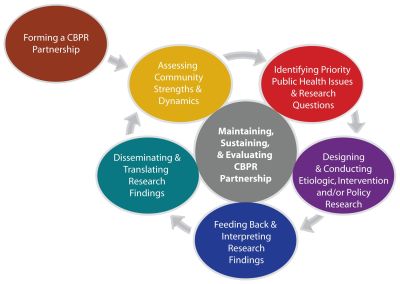Click on this video to hear Detroit URC Board Member, Zachary Rowe, describe CBPR:
We define community-based participatory research as a partnership approach to research that equitably involves community members, organizational representatives, and academic researchers in all aspects of the research process. It enables all partners to contribute their expertise, with shared responsibility and ownership; it enhances the understanding of a given phenomenon; and, it integrates the knowledge gained with action to improve the health and well-being of community members, such as through interventions and policy change (Israel, Schulz, Parker, and Becker, 1998).
While every CBPR project may not involve an intervention, there is a commitment to feeding back the data, jointly interpreting the data, disseminating the data, and translating the data into interventions and/or policy.

There are seven broad core components or phases of CBPR and there is some sequential order to conducting CBPR. However, the process is more circular than linear, and some elements may continue throughout the entire CBPR study. For example, as indicated by the large grey circle in the center of the figure below, maintaining and sustaining a partnership occurs throughout the different phases of the process, as partners work on an ongoing basis to strengthen trust, resolve conflicts, develop and share knowledge and skills, as they work together to carry out the tasks involved in conducting the research. Similarly, evaluation of the partnership’s effectiveness needs to start at the beginning and continue throughout a CBPR project.

Ultimately CBPR is an approach to research that is about effecting change to improve health and well-being in the communities involved. It is important to understand that CBPR is an approach to research not a specific method or research design. Thus, there are no 'CBPR methods', rather CBPR studies can involve quantitative methods (for example surveys, environmental audits) and qualitative methods (such as focus groups, in-depth interviews). CBPR studies can also use multiple research designs (for example case studies, longitudinal, quasi-experimental, and randomized staggered interventions).



